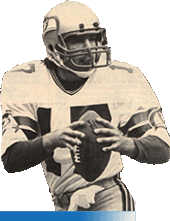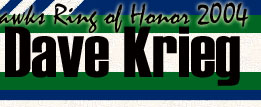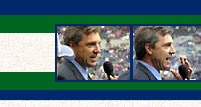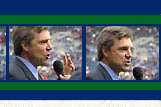

    |
|
The Beginning: "I think when I was 5 years old, I got my first Bart Starr uniform," Krieg said. Continue reading
The Seahawk Years: Dave Krieg trotted from the bench, threw touchdown passes to Steve Largent and Paul Johns and engineered a third.
Retirement: Fitting that after so many years, Dave Krieg chose to return to the place where he began his NFL career to announce his retirement.
What Others Say About Dave: Jerry Wunsch -- "When I was growing up, Seattle was my favorite team because of a guy name Dave Krieg. ...
Dave on Dave: "Sometimes you just wonder how I've been able to last 17 years coming from Milton College," Krieg said.
What You Say about Dave: Dave is my favorite football player of all time for one reason. He played at the highest possible level that his talent would allow and then he squeezed out even more by working hard.
Dave Krieg for Ring of Honor! He's made it! Thanks to all of you who sent letters to petition the Seahawks for Dave's rightful place in the Ring of Honor!
Dave's World Tour: Dave's been ... uh ... he's been ... well ... I'm not sure where all he's been but some of our super secret Seahawks fans have spotted him in some interesting places and we've got the film to prove it!!
Dave's Stats: He ranks seventh in the NFL all-time in attempts (5,309), completions (3,105) and passing touchdowns (261). His 38,147 passing yards rank eighth.
|
Interview with Dave Krieg Previous | Page 4 | Next
John Sawyer has said ...
"His nickname is Country," Dave interjected. "He lives in Louisiana. Does stuff with alligators and shrimp. Crazy!"
John Sawyer has said, “Jim would never say anything negative. He would get killed by the pass rush, or you could drop a pass and he would never give up, never tell you that you did wrong. He wouldn’t tell nobody nothing. If the same thing happened to Dave, he’d tell you in no uncertain terms. He made sure you would understand what you did wrong.”
Fair comment on you? Was this what you were like even as a rookie? What did the players think when you told them things in no uncertain terms? "I never heard John say that before but I guess I would get vocal with my leadership skills. Once I got caught up in the game and playing, once it started, I wanted to win, and do whatever it took to win." On the field, Dave told us he would say, "Great job," or "I screwed up," or "We need some more time over here." "You can block, come on, we need some more time. Things like that. Good run, you’ve got to make that catch, I've got to make a better throw. I would get on myself too, and say, 'Hey, We’re all in this together and I’m just as responsible as everyone else.' Accountability was a big thing. That was part of my leadership, I guess." "Sometimes you can say too much, start blaming people. I always prided myself on not blaming anybody else. If we lost the game, I would take the responsibility. I'd say, 'Hey, I didn't do a good enough job, I didn’t complete enough passes, I threw too many interceptions.' If we won, I’d say that the offensive line did a good job. I'd dish the credit out. It helps with the whole team to take responsibility for loss. Everybody likes to take credit, no one likes to take blame. Why not one guy take the blame, then the rest of the guys on the offensive line don't have to worry about it too much."
Along with the good times under Chuck Knox there were some hard ones too, like the injuries, playoff disappointments and some pressure to bring in another quarterback.
Many of the things were aired and dissected in pretty brutal detail in the Seattle media. You’d have needed to be strong to carry on under the weight — how did you cope with it all, and are there lessons from that time that are still valuable to you today? "There's really nothing you can do about an injury. You just have to wait around until you get healthy again. In the NFL and the pros, your ability to rehabilitate is really good because they have great trainers and doctors that show you how to do all that stuff. If you're a regular guy in the workforce, you might go to somebody and they say to do this, do that, but in the NFL they tell you how, why, and how many times to do it. You want to get yourself as healthy as you can. So the injuries, no control over them." "Losses? You have control over that and it eats at you. You have a week in-between each game which makes it even worse. In the NBA or in baseball, you make a mistake, you have a game in the next day or two and forget about it. The NFL haunts you. The press writes about it, the team says something about it, the radio says something, pretty soon all the people are talking about it. It was something I had to adjust to. In Milton, we didn't have any reporters, whether it be television or newspaper, come in and interview us. Big adjustment for me right there. Everybody at first said, 'Oh, that kid from Milton, small college!' My first three years they said, 'Oh! That's great!' When the expectation level went up and sometimes we didn't meet that level, or sometimes I wouldn't meet that level, they would get on you pretty good. That was difficult for me to get used to."
|